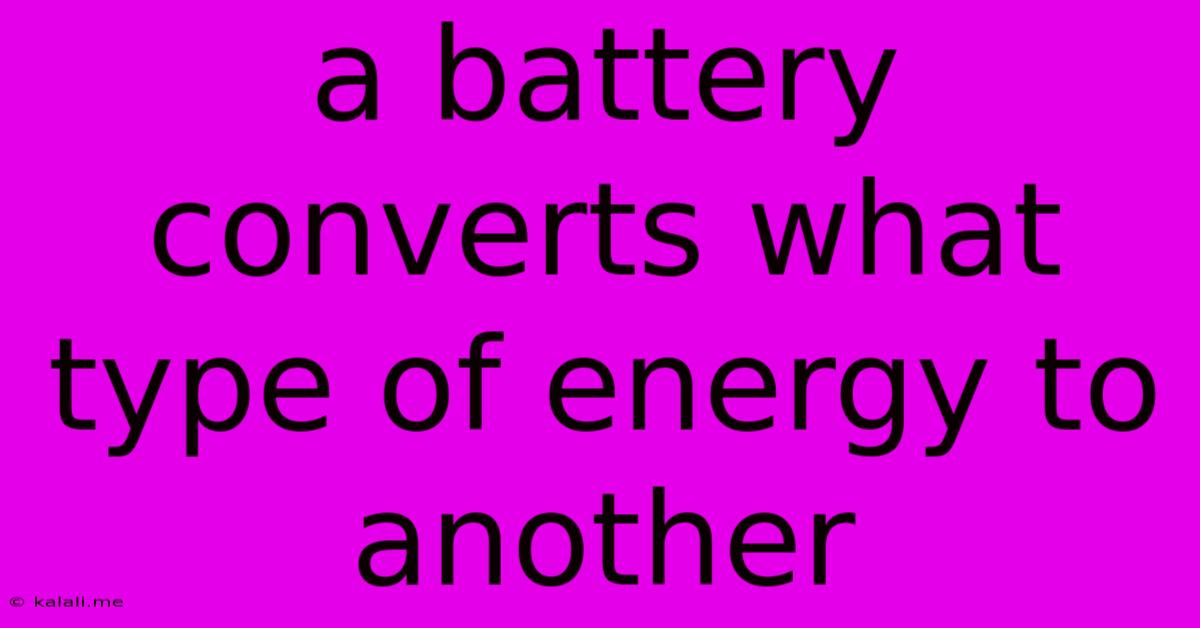A Battery Converts What Type Of Energy To Another
Kalali
Jun 15, 2025 · 3 min read

Table of Contents
A Battery Converts Chemical Energy into Electrical Energy: A Deep Dive
A battery is a ubiquitous device powering everything from our smartphones to electric vehicles. But have you ever stopped to consider the fundamental process at its core? This article will explore the fascinating transformation that occurs within a battery: the conversion of chemical energy into electrical energy. We'll also delve into the specifics of how this process works and some common misconceptions.
A battery doesn't create energy; it stores and converts it. The stored energy is in the form of chemical potential energy, specifically held within the chemical compounds that make up the battery's electrodes and electrolyte. This potential energy is released through a controlled chemical reaction, generating a flow of electrons – that's electricity! Understanding this fundamental principle is key to understanding how batteries function.
The Chemical Reaction: A Closer Look
The core of a battery's operation is a redox reaction, short for reduction-oxidation. This involves two electrodes: an anode (negative terminal) and a cathode (positive terminal), immersed in an electrolyte. At the anode, a chemical reaction occurs causing oxidation – the loss of electrons. These electrons then flow through an external circuit, providing the electrical energy we use. At the cathode, a reduction reaction takes place, accepting the electrons. This entire process creates an electrical potential difference between the two electrodes, driving the flow of electrons.
Different battery chemistries utilize different materials for their electrodes and electrolytes, resulting in varying energy densities, voltages, and lifespans. For example, alkaline batteries use zinc and manganese dioxide, while lithium-ion batteries – a dominant technology in portable electronics and electric vehicles – rely on lithium compounds. Each chemistry has unique characteristics affecting its suitability for particular applications. The type of chemical reaction employed directly influences the overall efficiency and performance of the battery.
Misconceptions about Battery Energy Conversion
It's important to address some common misconceptions:
- Batteries don't "create" energy: They convert stored chemical energy into electrical energy. The energy originates from the chemical reactions within the battery itself.
- Rechargeable vs. Non-Rechargeable: Rechargeable batteries, like lithium-ion, allow for the reversal of the chemical reaction through charging, restoring the stored chemical energy. Non-rechargeable batteries undergo irreversible chemical changes, rendering them unusable once the chemical potential energy is depleted.
- Energy Loss: Not all the stored chemical energy is converted into useful electrical energy. Some energy is lost as heat during the redox reactions. This loss is a factor influencing the overall efficiency of the battery.
Exploring Different Battery Types and Their Applications
The types of batteries available vary significantly, each suited to different applications based on their unique characteristics:
- Lithium-ion batteries: High energy density, making them ideal for portable electronics and electric vehicles. However, they can be expensive and have safety concerns related to overheating.
- Lead-acid batteries: Relatively inexpensive and robust, widely used in automotive applications. However, they have lower energy density than lithium-ion batteries.
- Nickel-metal hydride (NiMH) batteries: Offer higher energy density than alkaline batteries and are rechargeable. They are commonly used in cordless tools and hybrid vehicles.
- Alkaline batteries: Widely available and inexpensive, suitable for low-drain applications. They are not rechargeable.
Understanding the fundamental process of chemical-to-electrical energy conversion within a battery is crucial for appreciating its role in our technology-driven world. From powering our everyday devices to enabling sustainable transportation, batteries play a vital part in modern society and continue to evolve as technology advances. Further research into improving battery efficiency and safety is crucial for meeting the growing demands of a power-hungry world.
Latest Posts
Latest Posts
-
Distinguish Between Sampling And Non Sampling Errors
Jun 15, 2025
-
Which Of The Following Contains Both Ionic And Covalent Bonding
Jun 15, 2025
-
Consider The Parallel Plate Capacitor Shown In The Figure
Jun 15, 2025
-
Factors Of 225 That Add Up To 30
Jun 15, 2025
-
Bond Order Formula For Resonance Structures
Jun 15, 2025
Related Post
Thank you for visiting our website which covers about A Battery Converts What Type Of Energy To Another . We hope the information provided has been useful to you. Feel free to contact us if you have any questions or need further assistance. See you next time and don't miss to bookmark.